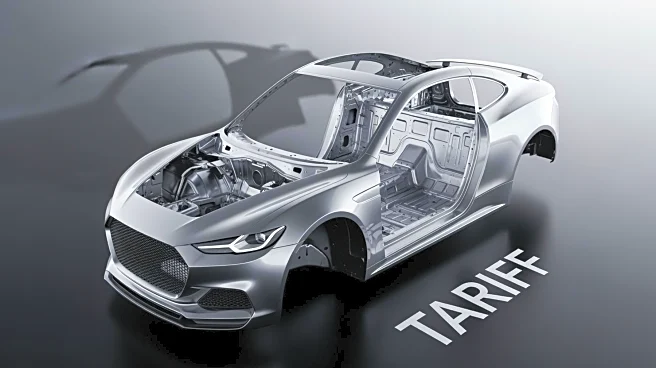What's Happening?
Slovakia, known as 'Europe's Detroit,' is facing significant challenges in maintaining its status as a leading automotive producer. The country's automotive industry, which accounts for 11% of its GDP
and a substantial portion of its industrial output, is under pressure due to U.S. tariffs imposed by President Trump's administration. These tariffs, set at 15% on most EU goods, have particularly impacted Slovakia, as 80% of its exports to the U.S. consist of cars. Additionally, Slovakia is experiencing increased competition from Chinese manufacturers and higher domestic taxes, which threaten its automotive sector's competitiveness. Despite these challenges, Slovakia continues to attract investments, such as Volvo's upcoming electric vehicle plant, but lacks targeted governmental support for industry transformation.
Why It's Important?
The situation in Slovakia is significant as it highlights the broader impact of international trade policies on local economies. The U.S. tariffs have created a challenging environment for Slovak car manufacturers, potentially affecting employment and economic stability in the region. The automotive industry is a critical component of Slovakia's economy, and any disruption could have ripple effects on its industrial output and employment rates. Furthermore, Slovakia's geopolitical stance and fiscal policies may influence its attractiveness to investors, affecting future economic growth and development. The country's ability to navigate these challenges will be crucial in maintaining its position in the global automotive market.
What's Next?
Slovakia's government may need to reassess its fiscal policies and trade strategies to mitigate the impact of U.S. tariffs and enhance its competitiveness in the automotive sector. The country could explore strengthening ties with other international partners and investing in infrastructure to support the transition to electric vehicles. Additionally, Slovakia's stance on EU energy sanctions against Russia and its relationship with European leaders may influence future investment decisions. The automotive industry will need to adapt to these changes, potentially seeking new markets and diversifying production to remain resilient in the face of geopolitical and economic shifts.
Beyond the Headlines
The challenges faced by Slovakia's automotive industry underscore the complexities of global trade and the interconnectedness of economies. The situation raises questions about the long-term sustainability of relying heavily on a single industry and the need for diversification. It also highlights the importance of strategic government support in fostering innovation and competitiveness in key sectors. As Slovakia navigates these challenges, the broader implications for EU-U.S. trade relations and the global automotive market will be closely watched by industry stakeholders.








